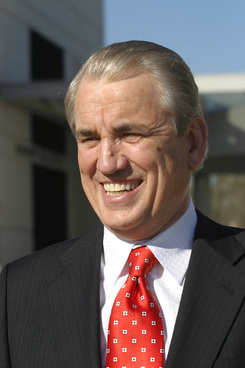O'Quinn Law Firm Can't Get Coverage for Millions in Settlement Overcharges to Clients, Fifth Circuit Rules
The U.S. Court of Appeals for the Fifth Circuit has denied an attempt by the late John M. O'Quinn's law firm to have an excess insurance carrier pay a portion of a $46.5 million settlement he paid back to breast implant plaintiffs for overcharging them on litigation expenses.
October 22, 2018 at 03:59 PM
3 minute read
 John O'Quinn.
John O'Quinn.
The U.S. Court of Appeals for the Fifth Circuit has denied an attempt by the late John M. O'Quinn's law firm to have an excess insurance carrier pay a portion of a $46.5 million settlement he paid back to breast implant plaintiffs for overcharging them on litigation expenses.
O'Quinn, who was a partner in Houston's O'Quinn & Laminack and earned a reputation as one of Texas' most successful plaintiffs attorneys before he died in a 2009 car crash, represented plaintiffs against breast implant manufacturers on a 40 percent contingency-fee basis.
O'Quinn earned approximately $263.4 million in contingency fees in the case, reflecting his success, and his clients never contended that O'Quinn was negligent or committed legal malpractice.
However, they later alleged that O'Quinn should not have deducted certain expenses from the settlement amounts paid to each plaintiff, including general expenses that paid for professional association dues, other lawyer's fees, flowers, fundraising and office overhead.
The dispute was sent to arbitration and a panel awarded $41.4 million to O'Quinn's clients, a decision which was affirmed by a state court. O'Quinn appealed the decision but later paid the clients $46.5 million. O'Quinn sought to recover $15 million of that amount from his primary and excess professional liability insurance carriers.
O'Quinn's primary insurance carrier paid its full policy limits of $5 million, but his excess insurance carrier, Lexington Insurance, refused to pay its policy limit of $10 million. A federal trial court concluded that there was no coverage under the terms of the excess policy—a decision O'Quinn's firm appealed to the Fifth Circuit.
In its recent decision, the Fifth Circuit also concluded that Lexington had no duty to indemnify O'Quinn and his law firm under the excess policy, noting the arbitration panel's conclusion that they breached their fiduciary duty to the clients by the actions they took regarding the general expenses.
“The district court concluded, and we agree, that the definition of 'Loss' does not cover the remedy that the arbitration panel imposed as a consequence of the breach of fiduciary duty,” wrote Judge Priscilla Owen. “The definition of 'Loss' says that 'Loss does not include fines, penalties, sanctions … [or] reimbursement of legal fees. The arbitration panel's award is either a fine, penalty, sanction, reimbursement of legal fees, or each of these.'”
Sharon McCally, a Houston attorney who represents O'Quinn and his law firm on appeal, did not return a call for comment.
Mike Choyke, a partner in Houston's Wright, Close & Barger who represents Lexington on appeal, also did not return a call for comment.
This content has been archived. It is available through our partners, LexisNexis® and Bloomberg Law.
To view this content, please continue to their sites.
Not a Lexis Subscriber?
Subscribe Now
Not a Bloomberg Law Subscriber?
Subscribe Now
NOT FOR REPRINT
© 2025 ALM Global, LLC, All Rights Reserved. Request academic re-use from www.copyright.com. All other uses, submit a request to [email protected]. For more information visit Asset & Logo Licensing.
You Might Like
View All
Foley Partner Wrapping Up Long Legal Career, 29 Years of Chairing MLK Jr. Oratory Competition in Houston
3 minute read
Texas-Based Ferguson Braswell Expands in California With 6-Lawyer Team From Orange County Law Firm
2 minute read

Crypto Entrepreneur Claims Justice Department’s Software Crackdown Violates US Constitution
4 minute readTrending Stories
- 1Am Law 200 Firms Announce Wave of D.C. Hires in White-Collar, Antitrust, Litigation Practices
- 2K&L Gates Files String of Suits Against Electronics Manufacturer's Competitors, Brightness Misrepresentations
- 3'Better of the Split': District Judge Weighs Circuit Divide in Considering Who Pays Decades-Old Medical Bill
- 4Which Georgia Courts Are Closed Today?—Here's a List
- 5After DEI Rollbacks, Employment Lawyers See Potential For Targeting Corporate Commitment to Equality
Who Got The Work
J. Brugh Lower of Gibbons has entered an appearance for industrial equipment supplier Devco Corporation in a pending trademark infringement lawsuit. The suit, accusing the defendant of selling knock-off Graco products, was filed Dec. 18 in New Jersey District Court by Rivkin Radler on behalf of Graco Inc. and Graco Minnesota. The case, assigned to U.S. District Judge Zahid N. Quraishi, is 3:24-cv-11294, Graco Inc. et al v. Devco Corporation.
Who Got The Work
Rebecca Maller-Stein and Kent A. Yalowitz of Arnold & Porter Kaye Scholer have entered their appearances for Hanaco Venture Capital and its executives, Lior Prosor and David Frankel, in a pending securities lawsuit. The action, filed on Dec. 24 in New York Southern District Court by Zell, Aron & Co. on behalf of Goldeneye Advisors, accuses the defendants of negligently and fraudulently managing the plaintiff's $1 million investment. The case, assigned to U.S. District Judge Vernon S. Broderick, is 1:24-cv-09918, Goldeneye Advisors, LLC v. Hanaco Venture Capital, Ltd. et al.
Who Got The Work
Attorneys from A&O Shearman has stepped in as defense counsel for Toronto-Dominion Bank and other defendants in a pending securities class action. The suit, filed Dec. 11 in New York Southern District Court by Bleichmar Fonti & Auld, accuses the defendants of concealing the bank's 'pervasive' deficiencies in regards to its compliance with the Bank Secrecy Act and the quality of its anti-money laundering controls. The case, assigned to U.S. District Judge Arun Subramanian, is 1:24-cv-09445, Gonzalez v. The Toronto-Dominion Bank et al.
Who Got The Work
Crown Castle International, a Pennsylvania company providing shared communications infrastructure, has turned to Luke D. Wolf of Gordon Rees Scully Mansukhani to fend off a pending breach-of-contract lawsuit. The court action, filed Nov. 25 in Michigan Eastern District Court by Hooper Hathaway PC on behalf of The Town Residences LLC, accuses Crown Castle of failing to transfer approximately $30,000 in utility payments from T-Mobile in breach of a roof-top lease and assignment agreement. The case, assigned to U.S. District Judge Susan K. Declercq, is 2:24-cv-13131, The Town Residences LLC v. T-Mobile US, Inc. et al.
Who Got The Work
Wilfred P. Coronato and Daniel M. Schwartz of McCarter & English have stepped in as defense counsel to Electrolux Home Products Inc. in a pending product liability lawsuit. The court action, filed Nov. 26 in New York Eastern District Court by Poulos Lopiccolo PC and Nagel Rice LLP on behalf of David Stern, alleges that the defendant's refrigerators’ drawers and shelving repeatedly break and fall apart within months after purchase. The case, assigned to U.S. District Judge Joan M. Azrack, is 2:24-cv-08204, Stern v. Electrolux Home Products, Inc.
Featured Firms
Law Offices of Gary Martin Hays & Associates, P.C.
(470) 294-1674
Law Offices of Mark E. Salomone
(857) 444-6468
Smith & Hassler
(713) 739-1250






